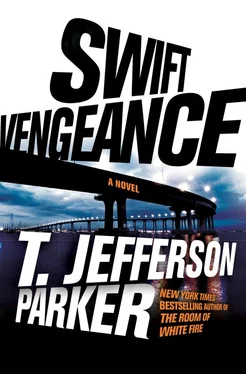She dug her phone from her coat. She held her device up close and it chimed and a cool glow played off her face. I looked for the hematoma but couldn’t make it out. Wondered if it prognosticated dire events, like my own scar did. Her pale raptor’s eyes seemed to draw the light from the screen as her thumbs flew and the glow from the phone changed colors. She stared at the screen for a long moment, then slid the phone back into her pocket.
“Sorry,” she said. “My handlers like a short leash these days. Your turn now. What did you learn about Hector Padilla?”
I told her about my conversation with youth imam Hadi Yousef, and the odd behavior of Padilla at Masjid Al-Rribat Al-Islami. His interest in Islam, and in finding a Muslim woman. His loitering outside the women’s prayer room. When I told her about the large sharpening stone that had fallen from Hector’s upturned backpack and landed on Hadi’s desk, Taucher’s breath caught. “Who carries around a fucking sharpening stone?”
“Hadi said it looked new.”
Taucher’s eyes narrowed, and, heavily made up or not, sparked with anger. “Is he still working at that hospital on Genesee?”
“He works a midnight shift,” I said. “And yes, he worked the night Kenny Bryce was killed.”
She betrayed some small hint of appreciation of my professional reach. “You have a source at First Samaritan?”
I shrugged. One of my old deputy friends was their head of security. For him, a call to the janitorial subcontractor was all it took.
“I need one more thing,” I said.
“You’re the neediest informant I’ve ever run.”
“I have to see the surveillance video from Kenny Bryce’s place.”
An SDPD police cruiser came by, tires swooshing through the quickly rising rainwater. The patrolman gave us a look.
“That’s physical evidence,” she said. “They’d have my head. God, I have to stop saying things like that. Anyway, the surveillance video is a tall order, Ford.”
“I understand.”
“Maybe you don’t,” she said. “The video is FBI property and I can’t let it leave the building. Not physically, not electronically. Either one gets me written up, demoted, or canned.”
“Send me a self-destruct file,” I said. “Then I can’t betray you.”
Exasperation. “They’ll see it the second I send it.”
“Have someone else send it.”
Spy versus spy, I thought. Until now, I’d never thought of Taucher as at risk from her own organization. I’d thought of her as a rock. Now I wondered about her short leash. But as I considered it, I saw that she would have her internal enemies, just like any other ambitious employee. Maybe more. Her fierce attitude. Her blunt humorlessness. Her legendary obsession with 9/11. The fact that she could never quite be a part of the old-boys network.
“And,” she continued, “if I bring you back to JTTF again to show you that video behind closed doors, heads will turn. ‘What’s with Taucher and that PI? What’s the paranoid old hag up to now?’”
I told her I knew what it was like to work in a large organization. What happens if it turns on you. “You might enjoy private work, Joan. Like mine.”
“Is that supposed to be funny?” But before I could answer, she said, “But you should see it — the Bryce video. I’ll think of something.”
“Six and a half seconds,” I reminded her.
“I’ve got an idea,” she said. “But get off my back, Ford. I don’t negotiate.”
I nodded and watched the rain pelting the bay, half amazed that Joan Taucher would put herself at risk to help her neediest informant. I’d been a genuine help to her so far — I’d brought Caliphornia and his threats to her instead of to her superiors — but how much more favor would that earn me?
And I was puzzled, but somehow pleased, that heavily made-up Taucher had chosen to be seen outside by me. I wasn’t sure why I was pleased. Maybe something as simple as not disliking her. Maybe something as simple as being on the same side. “It’s all about risk and trust,” I said.
“What is?”
“Heading into a storm you know is there,” I said.
A glimmer of mirth in her eyes. “It doesn’t rain in San Diego,” she said.
Psychiatrist Jared Leising had seen Kenny Bryce approximately twenty-four hours before his death. Bryce had been in treatment with the doctor for four years. Kenny had left the Air Force two years previous, to do landscape maintenance for Kern County, but apparently he had thought highly enough of the doctor to drive the four-plus hours from Bakersfield to Las Vegas once a month to see him.
Leising was wiry, in his early fifties, with a pair of rimless Freudian glasses and a sharp Vandyke to complete the psychoanalytic look. He had told me over the phone that Kenny Bryce was one of his favorite people, and he was shocked by what had happened. He had been expecting a call from the Bakersfield PD, not from a PI from San Diego.
Hall Pass 2 had landed me here in Las Vegas just in time for a $7.99 all-you-can-eat breakfast buffet at a minor downtown casino and a short Uber to Dr. Leising’s office. The storm had passed and the late Las Vegas morning was cold and sunny.
Leising’s consulting room was crisply lit and furnished in a fifties desert style — orange carpet, an aqua-colored couch and chairs, and lime-green wall assemblies in various geometric shapes. I took one of the aqua chairs and Leising the other.
He crossed his legs and set his notepad and pen on the white cylindrical stand beside him. “I don’t know where to start or what to say,” he said. “Can you ask me the questions? Rather than what usually happens here in this room?”
“Tell me how you met Kenny.”
It was four years ago, Leising said, while Kenny Bryce was flying Headhunter missions out of Creech AFB. Kenny had come to him on the advice of his pilot, Marlon Voss, and his sensor, Lindsey Rakes, both of whom were seeing Leising occasionally to work through “combat-related stresses.”
It surprised me that Lindsey had never mentioned her psychiatrist. But I’m a believer in the right to keep and bear secrets. Which is probably why the Headhunters had taken their burdens to someone outside their own Air Force mental health system. Combat stress is hard enough; the stigma of PTSD is a military career killer.
Dr. Leising’s voice was clear and his words seemed to be amplified by the hard, brightly colored surfaces of the interior. He said that he thought he could help Kenny, because Bryce’s symptoms were not unlike those of Voss and Lindsey, and a number of other RPA — remotely piloted aircraft — operators that Leising had treated.
He said that his general approach with combat stress was to go light on drugs and heavy on talk, exercise, and clean living. Mostly talk, he emphasized. He was old-fashioned in that way.
“What were Bryce’s symptoms?” I asked.
“Fatigue. Anger. Anxiety. Sleeplessness. Confusion. Like many other people, Kenny tried to self-regulate with alcohol and marijuana. Which exacerbated the symptoms and dulled his performance as a flier. And later, in his job with the county, in Bakersfield.”
I thought of what Lindsey had told me of the Reaper team’s long and tedious hours in flight, the fruitless patrols and surveillances, the many weeks spent watching one man on the ground, miles away, a known terrorist, surrounding himself with innocents because he knew that to be alone meant death from above. Then the moment when he needed to move into the open, and the sudden violence the Headhunters unleashed. If the mission took place at night, the crew would see their target explode in the eerie infrared light. If the mission was during the day, they would see their target blown apart in a post-pixelation high-def gorefest intimate in its closeness and focus. And if there was any doubt that their target had been destroyed, they’d send down another missile to make sure. She told me that often, four or five Reapers at once were deployed on a targeted kill. Their firepower was lethal and accurate and meticulously recorded. That was Lindsey’s job as sensor operator. She may have been flying from a trailer at Creech, but her unblinking vision was right there when the missiles hit, Roland — collecting the images and sending them back to her ground-control station. Lindsey had told me that those mental pictures were part of their take-home pay. You took them home and tried to find a place to hide them.
Читать дальше












